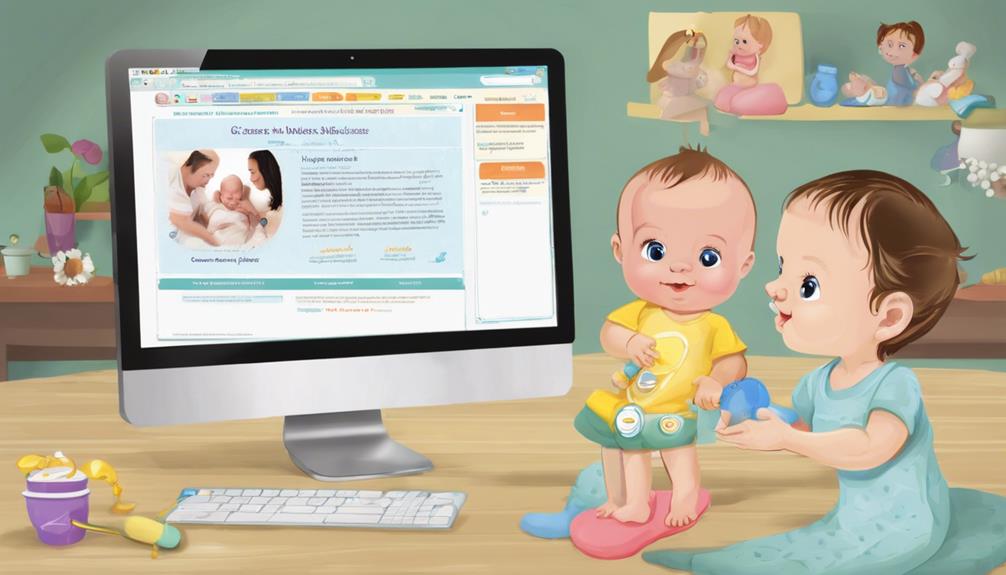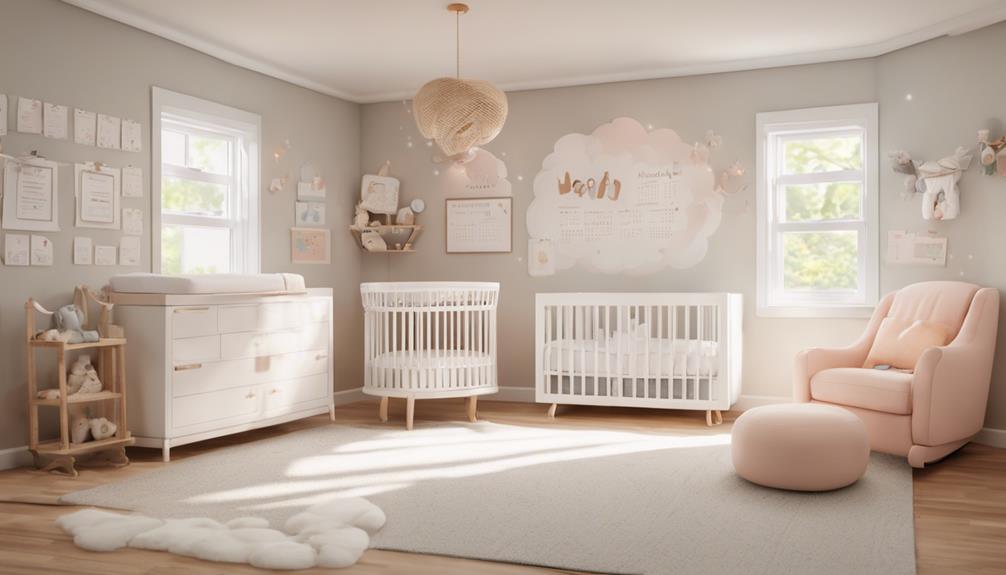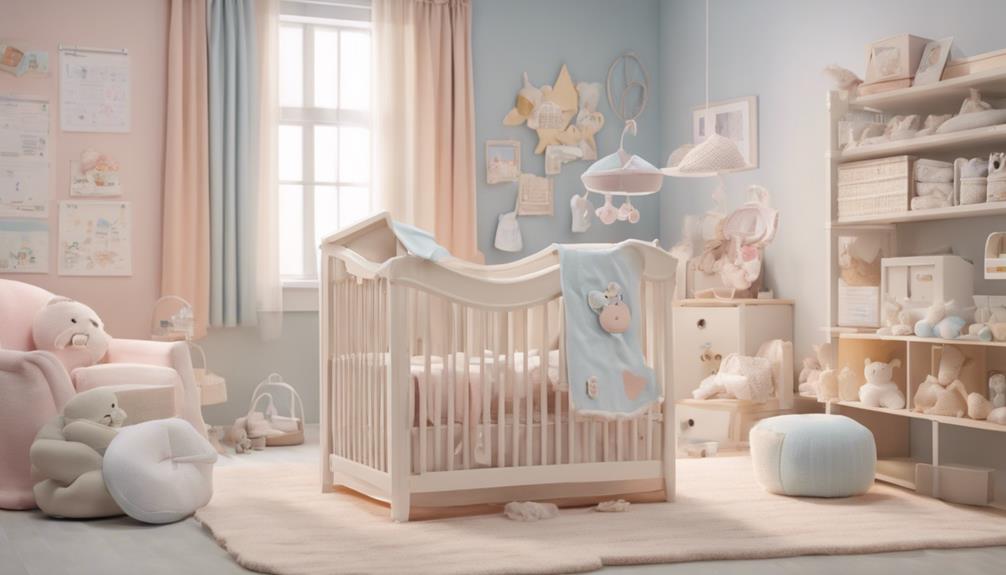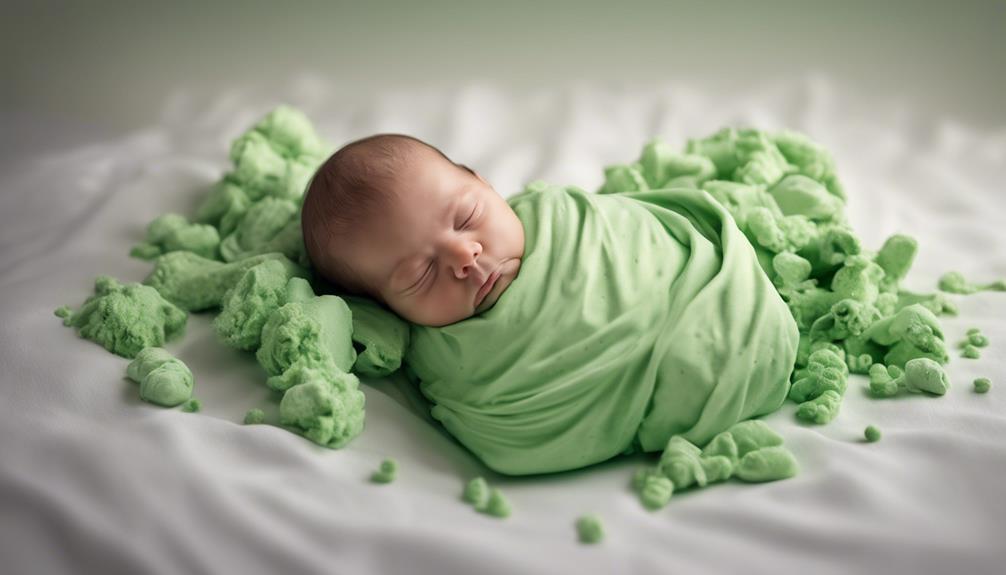Starting the adventure of looking after a brand-new baby sure feels like a big deal. It’s like holding a tiny, whole world in your hands. With so many choices online, it’s tough to know who to listen to for solid advice.
However, by exploring the domain of online newborn care classes, a beacon of knowledge awaits, offering essential skills and insights. Let's uncover together the top 7 classes tailored to support us in providing the best care for our precious little ones, ensuring a strong foundation for their well-being and our parenting journey ahead.
Key Takeaways
- Learn essential newborn care skills from expert-led online classes.
- Understand the importance of nutrition and feeding for newborns.
- Prioritize safety measures and health concerns for your baby's well-being.
- Seek parental support and coping strategies to navigate the challenges of early parenthood.

Graco Outpace LX All-Terrain Travel System - Includes SnugRide 30 Lite Infant Car Seat, Briggs, High-Performance Stroller/Car Seat Combo, Practical & Durable
Durable Design: All-terrain never-flat rubber tires that offer easy maneuverability
As an affiliate, we earn on qualifying purchases.
The Baby Manual
Exploring the detailed online infant care classes offered by The Baby Manual provides new parents with essential knowledge and practical skills for confidently getting through the early stages of newborn care. The Baby Manual stands out as a valuable resource for parents seeking guidance on various aspects of infant care. From learning about the necessary baby gear to mastering breastfeeding techniques and diapering, this online platform covers essential topics with clarity and depth.
One of the standout features of The Baby Manual is its inclusion of key point summaries, making it easier for new parents to grasp and retain important information.
With unlimited access to course materials for up to one year, parents can revisit the content as needed, ensuring that they've ongoing support and guidance during the challenging early stages of caring for a newborn. The Baby Manual equips new parents with the confidence and skills necessary to provide the best possible care for their little ones, making it a valuable investment in their parenting journey.

6-in-1 Convertible Baby Stroller with Bassinet Pushchair - Folding Infant Newborn Stroller w/Footmuff, Rain Cover, Cup Holder & Large Storage, Toddler w/All-Scene Large Wheels, Reversible Seat(Black)
Space to Grow & Explore - Baby stroller is designed to grow with your child. Easily switch from...
As an affiliate, we earn on qualifying purchases.
Boot Camp for New Dads

Moving from the detailed infant care classes provided by The Baby Manual, we now shift our focus to the specialized workshop tailored for first-time fathers known as Boot Camp for New Dads. This men-only workshop equips first-time dads with essential practical skills like swaddling, bottle feeding, diapering, and bathing newborns. Through expert interviews and interactive sessions, Boot Camp for New Dads offers valuable insights and guidance to help new fathers navigate the early stages of fatherhood with confidence.
One of the key objectives of Boot Camp for New Dads is to guarantee that dads gain the necessary skills and knowledge to care for their newborns effectively. The course structure includes 5 hours of video content, an 82-page workbook, and an impressive 18 months of post-course development support. This thorough approach not only empowers fathers with hands-on techniques but also provides ongoing assistance for their journey into parenthood.

Accombe 2 in 1 Baby Stroller, Convertible Bassinet Pushchair for Infants and Newborns 0-36 Months
🚩2 in 1 Convertible Stroller: This versatile baby stroller doubles as a moving baby bassinet. With adjustable backrest...
As an affiliate, we earn on qualifying purchases.
Dads Adventure: Base Camp
At Dads Adventure: Base Camp, we explore dad-focused newborn advice through interactive hands-on learning. This platform offers practical insights and tips tailored to help fathers navigate the challenges of caring for their infants.
Through bonus sections addressing unique concerns and responsibilities, dads are supported in feeling more confident and prepared for their journey through fatherhood.
Dad-Focused Newborn Advice
Dads Adventure: Base Camp provides valuable insights and practical advice from experienced fathers to help navigate the challenges of newborn care. New dads can access a wealth of information on swaddling, bottle feeding, diapering, and bathing techniques through this online course.
The personalized approach tailored for dads in courses like NewbornCourse.com and Baby 101 by Tinyhood enhances understanding of infant care. Additionally, Boot Camp for New Dads offers an online class covering essential newborn care skills and includes a 144-page textbook for reference and guidance.
Interactive Hands-On Learning
Interactive Hands-On Learning at Dads Adventure: Base Camp provides invaluable practical guidance and insights for new fathers exploring the journey of parenthood. As new parents diving into the domain of fatherhood, the online newborn care classes offer a unique opportunity for hands-on learning experiences. Here are five key aspects of this interactive platform:
- Access to articles by experienced dads offering practical advice on infant care.
- Guidance on bonding with your baby and fostering a strong parent-child relationship.
- Strategies for managing stress and overcoming the challenges of fatherhood.
- Tips for honing essential parenting skills in a relatable and engaging format.
- A supportive community of fellow fathers sharing camaraderie and valuable insights on the parenting journey.

Baby Trend Expedition® Jogger Travel System with EZ Flex-Loc® Infant Car Seat, Millenium White
Baby Trend travel system car seat is designed for infants up to 30 lbs
As an affiliate, we earn on qualifying purchases.
NewbornCourse.com

At NewbornCourse.com, we offer expert-led video tutorials and interactive hands-on activities to help prepare new parents for the journey ahead.
Our all-inclusive subscription includes essential topics such as newborn care, mother care, baby gear, and healthy child development.
With a bonus section tailored for dads, our aim is to empower parents with the skills and knowledge needed to confidently care for their newborns.
Expert-Led Video Tutorials
Covering essential newborn care topics, the expert-led video tutorials on NewbornCourse.com provide invaluable guidance for new parents. These tutorials, led by certified educators and medical professionals, aim to equip new parents with the necessary skills and knowledge for newborn care.
Here are five key points about these expert-led video tutorials:
- Topics include newborn nutrition, sleep patterns, safety, and development.
- Certified educators and medical professionals lead the video tutorials.
- Subscribers get access to a thorough resource for newborn care, mother care, baby gear, and child health.
- The tutorials are designed to enhance the essential skills needed for caring for a newborn.
- New parents can rely on these tutorials for reliable and up-to-date information on newborn care.
Interactive Hands-On Activities
Exploring the journey of newborn care, our platform offers hands-on activities that empower new parents with practical skills essential for nurturing their newborn.
These interactive sessions include diaper changing, swaddling, and bathing demonstrations, providing essential practical guidance for mastering essential newborn care skills.
Through step-by-step tutorials in a virtual environment, parents can engage in a hands-on approach to learning these tasks, ultimately fostering confidence in their ability to care for their newborn.
By actively participating in these activities, parents not only prepare for the arrival of their baby but also gain the necessary expertise to handle various newborn care tasks effectively.
Our goal is to support parents in becoming competent and confident in their newborn care abilities.
Baby 101 by Tinyhood

Exploring the journey of newborn care is made easier with Baby 101 by Tinyhood, an interactive and all-inclusive online course designed to equip new parents with essential skills and knowledge. This all-encompassing online newborn care course, currently priced at $49, covers vital topics like breastfeeding, safety, and baby care, offering unlimited access for up to one year. Here are some key features of Baby 101 by Tinyhood:
- Interactive and engaging content to help you navigate the challenges of caring for a newborn.
- Bonus sections tailored for dads, ensuring all parents are well-prepared with practical skills for infant care.
- Accessible online platform, making it convenient for busy parents to learn at their own pace.
- Expert guidance on breastfeeding techniques and safety measures to keep your baby secure.
- A valuable resource providing all-embracing support and knowledge for new parents seeking guidance on newborn care.
Parents Place

At Parents Place, we offer a range of online classes designed to support new parents in developing essential newborn care and parenting skills. Our classes cover a variety of topics important for new parents, including newborn nutrition, safety measures, understanding developmental milestones, and coping strategies for the challenges of early parenthood.
Led by certified educators and medical professionals, our courses provide accurate and up-to-date information to help you navigate the journey of caring for your newborn with confidence.
One of the key advantages of Parents Place is the flexibility of our learning schedules. Our online format allows you to access the classes from the comfort of your own home, making sure to fit them into your busy routine as a new parent.
We acknowledge the importance of equipping you with the necessary knowledge and skills to make sure the well-being of your newborn and support you through this transformative time in your life.
American Red Cross First Aid/CPR/AED Online

Delving into the American Red Cross online First Aid/CPR/AED classes provides essential life-saving skills for infants, children, and adults, meeting OSHA certification requirements. These classes are important for parents, caregivers, and anyone responsible for infant care. Here are five key points to take into account about these courses:
- American Red Cross offers online First Aid/CPR/AED classes specifically tailored for infants.
- The classes cover essential life-saving skills not only for infants but also for children and adults.
- Certification obtained from these classes may require a hands-on, in-person skills component to demonstrate proficiency.
- Learning CPR and First Aid for infants is crucial as it equips caregivers with the knowledge and skills to handle emergency situations effectively.
- These classes play a significant role in empowering individuals to respond swiftly and effectively in situations where immediate action can make a difference in saving a baby's life.
Frequently Asked Questions
What Classes Should I Take Before My Baby Arrives?
Before your baby arrives, we recommend taking classes on labor basics, breastfeeding, infant safety, and postpartum wellness. Understanding newborn care, soothing techniques, and developmental milestones will help us shift into parenthood smoothly.
What Week Is Hardest With Newborn?
The first week with a newborn can be the toughest for parents as they navigate the round-the-clock care demands. Sleep deprivation and adjusting to a new routine can make this period challenging, but seeking support can ease the journey.
What Is the Hardest Stage of a Baby?
Exploring the various stages of a baby's development can be challenging. The newborn stage stands out as one of the toughest periods for new parents. It demands constant attention and care, like a delicate dance of love and exhaustion.
What Do First Time Parents Struggle With the Most?
First-time parents struggle the most with sleep deprivation, fear, anxiety, interpreting baby cues, balancing responsibilities, and adjusting to lifestyle changes. Our team comprehends these challenges and aims to provide guidance, support, and resources to help navigate parenthood.
Conclusion
As new parents, we comprehend the overwhelming feeling of caring for a newborn. These online newborn care classes are like a compass guiding us through uncharted waters, providing us with the knowledge and skills needed to navigate this new journey with confidence.
Just like a lighthouse guiding ships safely to shore, these classes illuminate the path ahead, helping us steer through the challenges of parenthood and ensuring the best care for our little ones.









